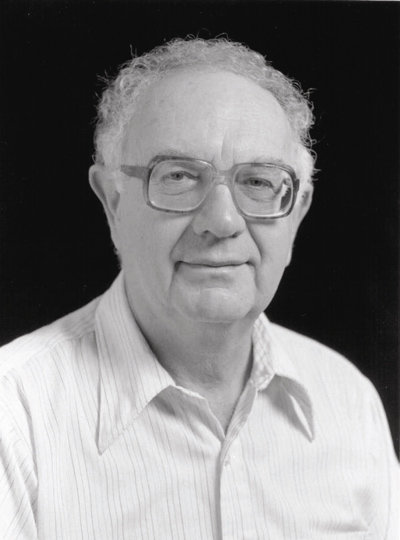In Memoriam: Jonathan Singer 1924-2017
February 9, 2017
By Kim McDonald

Jon Singer
UC San Diego
Jonathan Singer, one of the first members of the biology faculty at UC San Diego who helped build the campus into a world leader in molecular and cell biology, died on February 2 in La Jolla, CA. He was 92.
Singer, who joined the biology faculty in 1961, was not a formally trained biologist. He had a bachelor’s degree in chemistry from Columbia University, a Ph.D. in chemistry from the Polytechnic Institute of Brooklyn and was on the chemistry faculty at Yale University when David Bonner, the founding chair of UC San Diego’s Biology Department lured him to the La Jolla campus.
Bonner believed that studying biology at the molecular level with chemistry as its basis would revolutionize the biological sciences and Singer—who had been mentored as a postdoctoral fellow by Linus Pauling, the Nobel-Prize-winning chemist at Caltech and one of the founders of molecular biology—turned out to be the perfect fit for Bonner’s vision.
“Jon was one of the key figures who made the biological sciences at UC San Diego what it is today,” said Bill McGinnis, dean of the Division of Biological Sciences. “He was Bonner’s right hand man and shared his vision of building a new kind of biology department focused on molecular approaches to all branches of the biological sciences, one that would be deeply interconnected by collaborative research.”
Singer worked closely with Bonner to recruit new faculty who could advance this new molecular approach to biology. When Bonner died in 1964, after a long battle with Hodgkin’s disease, Singer took over as the chair of the department and carried out much of the work that Bonner had started, including planning the construction of the first building of the future School of Medicine.
Despite those administrative duties, Singer’s colleagues say he never lost focus on his research. He continued his studies of the structure of functional cell membranes, which he started at Yale, on the La Jolla campus, producing a seminal body of work on membrane proteins.
In 1972, he and biochemist Garth Nicolson, at the time a research associate at the Salk Institute for Biological Studies, published a groundbreaking paper in Science—now regarded as a classic in cell biology—on the “Fluid Mosaic Model” of the cell membrane, which would prove to explain a wide range of critical cellular processes, including cell-cell signaling, cell division, membrane budding and cell fusion. He later made important discoveries on the interaction between the cytoskeleton and the cell membrane.
In the last two decades of his life, Singer focused with colleague Nazneen Dewji, an associate adjunct professor in UC San Diego’s Department of Medicine, on a novel approach to a treatment of Alzheimer’s disease that centered on the interaction between two cell membrane proteins—beta-amyloid precursor protein and presenilin.
Singer was elected to the National Academy of Sciences in 1969 and the American Academy of Arts and Sciences in 1971. He held an American Cancer Society Research Professorship from 1976 to 1991, and won the E. B. Wilson Award from the American Society for Cell Biology in 1991. Singer was a University Professor of the University of California, an honor awarded to only 38 members of the UC faculty.
He is survived by his daughter Julianne, son Matthew, niece Laura and nephew Bill, as well as granddaughter Grace and grandson Michael.
In lieu of flowers, the family requests that donations be made to the Alzheimer’s Association.
